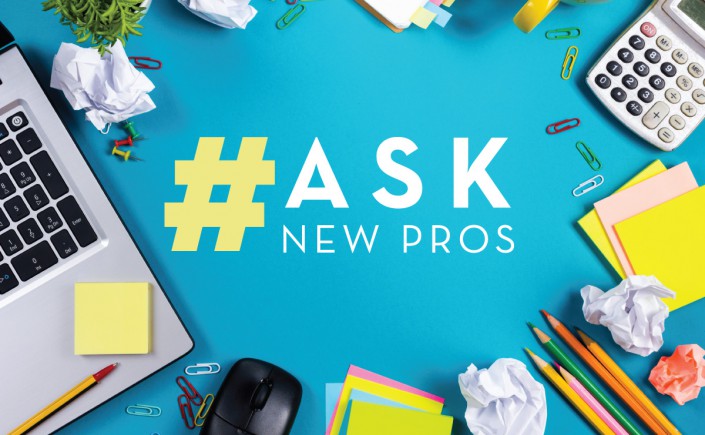This month, PRSA New Professional section committee members hosted a chat on managing as a new professional, based upon their earlier presentation of the same topic at PRSA ICON.
Read below for the recap of the chat with Hanna, Ruthann and Andrea!
Editor’s Note: This blog originally appeared on the PRSSA Progressions blog. Whether you’re a college student or a New Pro, it’s important to build strong chapter relationships between PRSA and PRSSA.
The dynamic nature of the public relations profession, coupled with the current market saturation of recent and soon-to-be graduates, requires that students go above and beyond to create meaningful connections and make themselves stand out. One of the most valuable benefits of PRSSA membership is the opportunity to befriend and learn from local PRSA professionals.
The relationship between PRSSA and PRSA Chapters is an important one. PRSA sponsor Chapters provide mentorship, programming and fundraising assistance, training and industry insights, and students preparing for their careers need talented and engaged professionals to emulate. However, the day-to-day rigors of life, school and work can make managing these relationships especially challenging. As a PRSSA Chapter member or leader, here are some things you can do to kick-start your Chapter’s relationship with PRSA:
Help them help you. PRSA members are working professionals and contribute to PRSSA during their limited free time. They’re happy and eager to help, but it’s up to you to reach out and establish the foundation of a relationship. Don’t be afraid of the follow-up and always come prepared to talk about what help your Chapter could benefit from. Many times, PRSA professionals won’t know how to help you create a better member experience until you tell them.
Establish a constant. Because of the high turnover rate in PRSSA leadership, it’s difficult for Chapters to maintain meaningful relationships with PRSA annually. If you really want to leave a mark on your Chapter, create or utilize assets that can stand the test of time. Here are a few examples:
Be resourceful. PRSSA National has a wealth of resources available to you, as both a member and a leader. If you’re a Chapter leader and struggling to contact PRSA, you can reach out to: the vice president of professional development, the National Faculty Adviser or any other person on the PRSSA National Committee. Furthermore, consider reading the PRSSA/PRSA Relationship Manual or contacting someone in your area through theChampions for PRSSA directory — an exclusive PRSSA member benefit.
PRSSA members are the future leaders of the communications industry, and will one day be the CCOs and CMOs of the world’s most influential companies. It’s imperative professionals do a better job engaging, and students do a better job asking for that engagement.
 Gary Bridgens is a project assistant in APCO Worldwide’s New York office and the former PRSSA National vice president of Chapter development. You can contact him via email at garybridgens@gmail.com and add him on LinkedIn.
Gary Bridgens is a project assistant in APCO Worldwide’s New York office and the former PRSSA National vice president of Chapter development. You can contact him via email at garybridgens@gmail.com and add him on LinkedIn.

Networking- it’s a very intimidating word, especially for those who cringe at the idea of meeting complete strangers at a happy hour or local event. Though it may come off as intimidating, the truth is that mastering the art of networking is a crucial step to land your first job. The expression “it’s who you know” isn’t a myth and it certainly isn’t an expression that should be underestimated. As someone who began their first post-graduation job in August, I can vouch for the importance of networking. I can also provide some tips on how networking and landing your first job go hand-in-hand.
1. Utilize Your Resources
When looking for a first job, it can be tempting to start the search with platforms like LinkedIn, and while you may find some great positions listed, it’s not where I would begin. Very often when looking for your first job, it’s the people already in your circle that’ll help find the position you want, and ultimately, get you that position. Whether it’s a professor, classmate, or family friend, chances are that you have a connection in the field that you are applying. Once you establish that connection, don’t be afraid to reach out. It may be an unspoken truth, but people in the communications field (and in general) like to talk about themselves and their professional experiences. If you reach out with a positive attitude and genuine curiosity about the work they do, you’re golden.
2. Put Yourself Out There
Grounding yourself in the professional world requires you to get out there- literally. If you have colleagues or friends going to a networking happy hour or sporting event, make sure to get that plus-one invite. Being open to meeting new people and stepping out of your comfort zone is the first step in securing that first job. Even more important, it gives you the opportunity to be asked the first impression question: Who are you? This is where your perfected 30 second elevator pitch comes in handy. No matter who is asking, consider them a possible professional connection and sell yourself. Make sure your presentation doesn’t sound staged or rehearsed, as people respond better to conversation that sounds genuine and honest.
While these two pieces of advice aren’t the only ones to consider when looking for your first job, they encompass the big ideas. Everyone has been in your shoes before: colleagues, your boss- and everyone gets how difficult it is to assimilate into the real world. The most important thing to remember is that the people around you are the ones that matter. They are in your circle and consider themselves a connection for a reason- use that. Taking advantage of networking opportunities will pay off in getting you that first job and it will pay off in the career path you choose. Understanding how to talk to people, especially those who you want something from, is an invaluable skill. So next time you are stepping into a networking event, try to let go on the intimidation and nervousness, and remember that it’s just one piece in the puzzle to help you get your first job.
 Evan Martinez is a Communications Associate at American Iron and Steel Institute, a DC- based trade association representing the North American steel industry on Capitol Hill.
Evan Martinez is a Communications Associate at American Iron and Steel Institute, a DC- based trade association representing the North American steel industry on Capitol Hill.

The Public Relations Society of America’s annual International Conference was held Oct. 23-25, 2016 in Indianapolis, Ind. We’re thrilled that a number of New Professionals section members were able to attend, and if you weren’t, read on for our recap.
New Pros Breakfast
The conference officially kicked off Sunday, with New Pros gathering for a networking breakfast.
Thanks to all who joined our New Pros session at PRSA International Conference – it was great to meet some fellow new pros and hear from seasoned professionals from the College of Fellows. We covered tips including first jobs and how to get involved in PRSA. If you’re interested in getting more involved and volunteering for the New Pros section, reach out to get involved! – Jessica Noonan, Chair, PRSA New Pros
Planning to join PRSA in the next couple months? Use the code AM16 to get a free New Pros Section membership when you apply to become a PRSA Associate Member.
“Where Are They Now?” – New Pros Panel at #PRSSANC
The New Pros section also hosted a panel for students at the PRSSA National Conference. Top tips included:
My advice to my 21-year-old self would be to relax. Don’t worry so much about graduation and focus on making the most of your last classes, internships and time as a student. – Nick Lucido, Immediate Past Chair, PRSA New Pros
You can rely on your network for support and guidance for the job search. But if you’ve gone dark on a person for a nine months and reappear asking for help it may not be as helpful as if you kept the relationship strong over time, so stay in touch with your connections. – Brian Price, Chair-Elect, PRSA New Pros
I was once told, “The only person holding you back is yourself.” Don’t be a roadblock to your own success. Believe you can achieve everything you dream of, be confident, and don’t let fear keep you from trying. – Heather Harder, Programming Chair, PRSA New Pros
Management Session Recap
On the final day of conference, the section led a session for New Pros (and their supervisors) on how to manage your first intern/new hire, client, project, and more. Top takeaways include:
To effectively manage up or be managed from below you must clarify and manage expectations and respect the boundaries and communication style preferences of the people that you work with on a daily basis. – Ruthann Campbell, Programming Chair, PRSA New Pros
When it comes to first-time managers, you have to be flexible. Remember that you are combining someone with little experience in management, with someone who has little experience in being managed. To effectively support your new hires, remember the 5’s: set expectations, structure, share (time, knowledge and networks), support and self-growth (because new pro managers learn too!). – Andrea Gils, PRSSA Liaison, PRSA New Pros
New Pros should begin managing their first client account or project once they have a successful track record of work, can handle an increased workload and have set expectations. It’s good exposure for them, especially with upper management and for mentorship opportunities. – Hanna Porterfield, Blog Chair, PRSA New Pros
Want to learn more on this topic? Join our next #NPPRSA Twitter chat on Tuesday, Nov. 15 at 9:00 p.m. EDT.
ICON Testimonials
Wondering if it’s worth going to PRSA ICON as a New Pro? Looking to convince your employer to help you attend next year? Simply want to learn more? We’d love to see you!
This was my first time experience with a PRSA conference. Attending would not have been possible without my involvement with PRSA New Pros as it was through volunteering for the national committee that I was presented with the opportunity to speak. It was invigorating to be able to meet new people and hear about the similar struggles and challenges being faced by professionals in all stages of their career and industries. I learned a lot about new tools and strategies to help me be more effective in my role at a non-profit. If you have the opportunity to get involved and participate at any level of PRSA, I highly recommend that you do so and in the words of a College of Fellow representative, don’t’ just join, join in! – Ruthann
#PRSAICON has been THE highlight of my year. I can’t believe it was my first conference and I was able to present too – all thanks to PRSA New Pros! My favorite part of this year’s conference was being able to talk to a new pro after our session. She was so engaged not just during our presentation but afterward as well. She was facing challenges that we’ve all have faced as new pros and it was very rewarding to be able to listen to her and help her tackle her challenges. I think there’s a perception that PRSA New Pros is for those who just graduated from college or PRSSA – and it is – but it’s also for those who are seasoned pros and may be new to public relations. Our session showed me that there are a variety of New Pros, who are all equally interested in our section and what it has to offer. – Andrea
Check out more recaps from general sessions on PRSA’s website. Contact any of our section committee members to learn more and see you at PRSA ICON in Boston, Oct. 8-10, 2017.

This is part of our recurring #AskNewPros series. Do you have a burning question for PRSA New Pros? Ask us!
Are there any certifications you wish you had or programs you wish you were familiar with walking into the job market?
These days, it’s incredibly common for young professionals to include “social media” in the Skills section of their resume. But isn’t there a difference between knowing how to share a photo on Instagram and being a true social media practitioner? Absolutely!
To stand out from the crowd, and help hiring managers understand that you really do have the ability to strategically use social media to reach audiences and convey key messages, consider receiving a certification – perhaps from the Hootsuite Academy or National Institute of Social Media.
 Jim Mignano is a Senior Account Executive at Text100 Global Communications specializing in technology and healthcare. He currently serves as the President of PRSA Rochester, and you can always find him on Twitter at @J_Mignano.
Jim Mignano is a Senior Account Executive at Text100 Global Communications specializing in technology and healthcare. He currently serves as the President of PRSA Rochester, and you can always find him on Twitter at @J_Mignano.